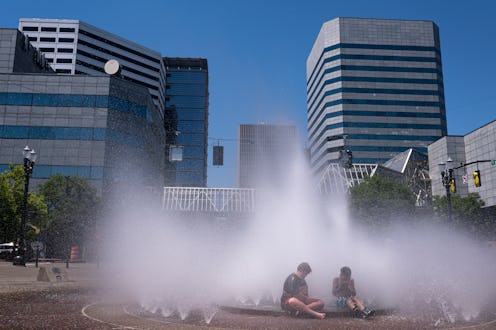Take Action
How To Help People Affected By The Pacific Northwest Heat Waves
Places to donate, resources to share, and more.

The Pacific Northwest heatwave is bringing record-breaking temperatures to regions where 50% of homes are not equipped with air conditioning, per NPR. Typical temperatures in Portland and Seattle are in the 70s during early summer, but over the weekend, the thermometer broke 115 degrees, according to The New York Times. This kind of heat, particularly in areas that don’t have the infrastructure to withstand it, can cause a range of dangerous effects, from melted cables and cracked roads to fatal cases of heat exhaustion.
On June 30, the National Weather Service warned that excessive heat watch will continue in portions of Montana, California, Washington, Oregon, and Nevada over the Independence Day holiday weekend. This weather is the result of what’s being called a heat dome — AKA hot air trapped under high pressure atmospheric conditions. Scientists believe that rising ocean temperatures are to blame for this phenomenon — a direct result of climate change.
Experts believe the issues the Pacific Northwest is facing could become the new normal across the country and world as climate change exacerbates. While the heavy lifting of climate reform is up to the government, you can help relieve the immediate effects of heat waves by helping to keep people stay hydrated, cool, and safe. Here’s how you can support people affected by the heat wave from home.
Donate To Pacific Northwest Organizations Providing Water And Shelter
There are various organizations accepting goods and resources to be used by people (and pets) in affected areas.
- Blanchet House, a shelter in downtown Portland, is currently looking for donations of reusable water bottles.
- Be Loved Bloc and Meals On Us PDX community organizations in Portland, are collecting Gatorade and cold water, as well as donations via Venmo.
- Meals on Wheels Spokane, a Washington organization for disabled seniors, is running a fan drive and taking financial donations.
- PetBlocPDX, an animal-focused mutual aid in Portland, is taking Venmo donations for pet supplies.
- Catholic Charities Eastern Washington is looking for donations of water misters for their outdoor courtyard.
- Bloodworks Northwest, a nonprofit in Seattle, is looking for blood donations.
- The Red Cross is currently experiencing an extreme blood shortage. Check out a site near you to donate blood or donate funds online.
Advocate For Climate Change Solutions
According to behavioral scientist and climate change policy advisor Sweta Chakraborty, Ph.D., calling out climate change as the culprit of increasingly intense heat waves is the first step to finding a real solution. “We can interact and join forces with our primary, secondary and even tertiary networks to spread and amplify our efforts in fighting climate change,” she says. Chakraborty suggests signing up for We Don't Have Time, a social platform that connects climate concerned citizens from around the world to create impact. “Begin engaging with like-minded peers around the globe, and watch virtual campaigns result in real world actions and changes,” she says.
If you don’t have room for another app in your life, you can still call your local representatives to advocate for legislation that would mitigate climate change. You could also donate to climate change organizations like:
- Climate Emergency Fund, an organization that funds activists and movements.
- Clean Air Task Force, which researches and advocates for low-carbon energy technologies.
- The Sunrise Movement, a youth climate change movement, network, and training force.
- Climeworks, a carbon dioxide removal initiative.
- Giving Green, which sends money and volunteers towards evidence-based progressive climate change projects.
- Project Drawdown, which supports climate change research and solutions.
Share Resources About Heat Wave Safety
Use your social media platforms to share information about how to stay safe during a heat wave. Per the Red Cross, you can direct your followers to cooling centers (Oregon, Washington and California), let them know how to locate air-conditioned areas, stay hydrated, avoid sports or unnecessary physical activity, remember never to leave pets or people in cars, wear loose light clothing, and to head to a shelter or cooling center if their situation at home is unsafe.